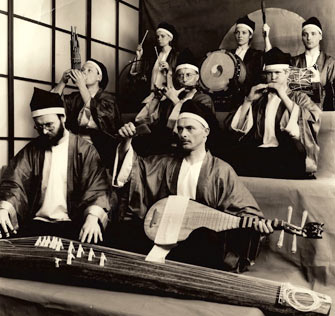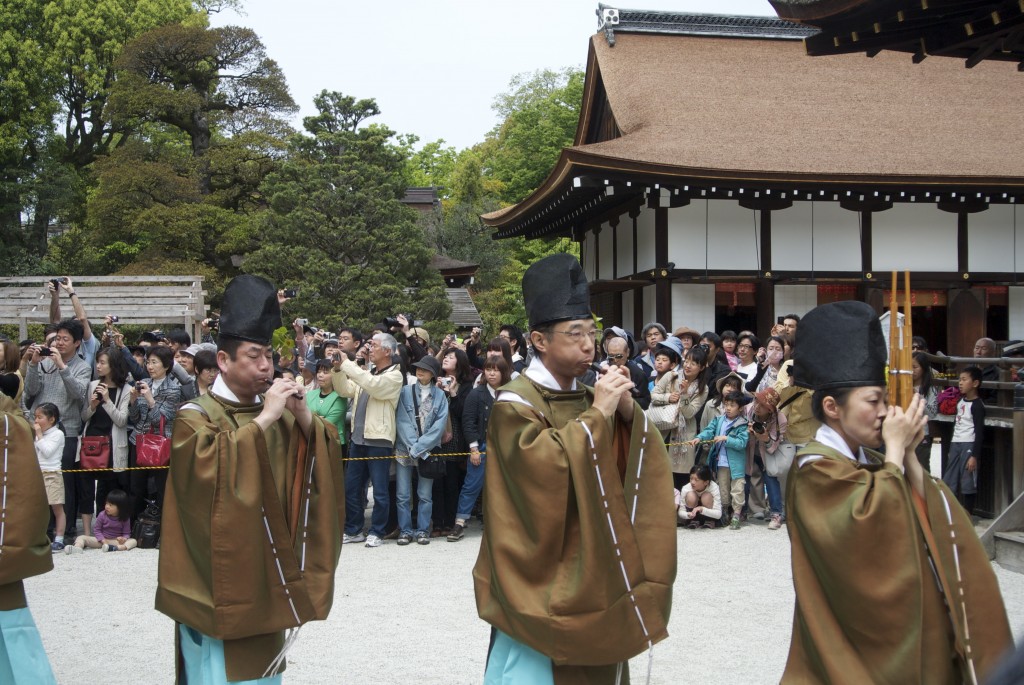
Tortoises in Heaven - a 1980s London gagaku group. Dean Brodrick is playing the sho in the middle row on the left.
This is Part Two of an interview with Dean Brodrick, who ran a 1980s gagaku group in London. (For Part One, click here.)
4) What venues did you play at, and how was the reaction?
I think we played at SOAS (part of London University), at the London Music Collective, and at the church of St.Giles next to the Barbican as part of a festival we organized called Music for a Summer Day (2nd July 1988). By this time we had renamed ourselves Tortoises in Heaven, to try and conjour up the ancient, slow moving and divine nature of the form.
I think people were most impressed, having never seen or heard the likes of gagaku in the UK ever before. We made a LP vinyl recording of all the music at that concert, called Golden Apples, which included the gagaku orchestra and 17 other groups. We pressed 1000 of the records on our own label Bonjour Records, a labour of love. But at that time we were doing many different forms of avantguarde performances and scarcely had time to notice people’s reaction.
5)) How long did the group stay together and why did it break up?
Looking back, I regret not keeping that group going longer. We played as a project for the few concerts we ourselves organized just during that year. I think we didn’t realize how special it was, and as everyone was involved in other bands, which had tours and recordings and some kind of following, whereas we had none, the costumes went back in the suitcase and have not come out since. I hope moths didn’t make them their home! I still have the hichiriki and have used it on many recordings requiring a strange wailing sound.

Japan-based Reigakusha Gagaku Ensemble
6) What do you think is the appeal of gagaku, and what would you say to those who find it difficult?
Gakaku claims the honour of being the oldest extant written music in Japan, and in fact the world. It is comprised of many musical traditions and influences that traveled the Silk Road, from the Middle East through Central Asia and Tibet. It flourished in the days of the T’ang Dynasty in China (618-907), and finally journeyed further to Korea. It was introduced to Japan during the 7th century, and the vast repertoire has been played in the Japanese Imperial court in an unbroken tradition since then.

gagaku instruments (from facts and details.com)
Gagaku is possibly the slowest music in the world. Its tempos have speeded up over the last century, according to musicologists, but they remain very slow. In our age, the age of speed and instananeousness, gagaku is like an antidote.
For the Japanese the music must have all sorts of associations, depending on ones family history and experience. It is frequently used as Shinto wedding music, for instance. For a non-Japanese it may sound like music from another planet.
Of course, gagaku does NOT employ the western equally tempered scale (a scale introduced by Europeans over the last 300 years, which many indigenous musics are being forced do adopt out of fear of sounding “out of tune” to a Western ear). In fact, nothing could be further from the truth. It is western music, now dominated by this artificial, unnatural, logorithmic so-called ‘equal temperament’, which utilizes tuning that is non-harmonically fixed – the subject for another essay!
So to the western ear gagaku has strange tunings, strange sounds, and strange forms in strange time signatures. It’s completely strange. And that was its appeal to me. But I must admit to having a palette for the exotic, a taste for the weird, and a leaning towards that which, at first, I do not understand.
Incidentally, the only time I’ve heard gagaku music quoted outside its Japanese context was on a TV advertisement for paracetemol, a medicine to alleviate pain. The head of a woman, her face contorted with pain, accompanied by gagaku music finds relief as the painkiller has its effect and the sublime Japanese imperial court music is replaced with… Vangelis!

Melissa Holding, one of the members of Tortoises in Heaven, picutred here playing koto
****************************************************************************************************************
For an absorbing one-hour documentary programme on gagaku, see this youtube film. To simply listen to an example of gagaku music, try this Unesco recording here.
****************************************************************************************************************

Gagaku music at Shimogamo Jinja during one of the Aoi Festival events

Leave a Reply